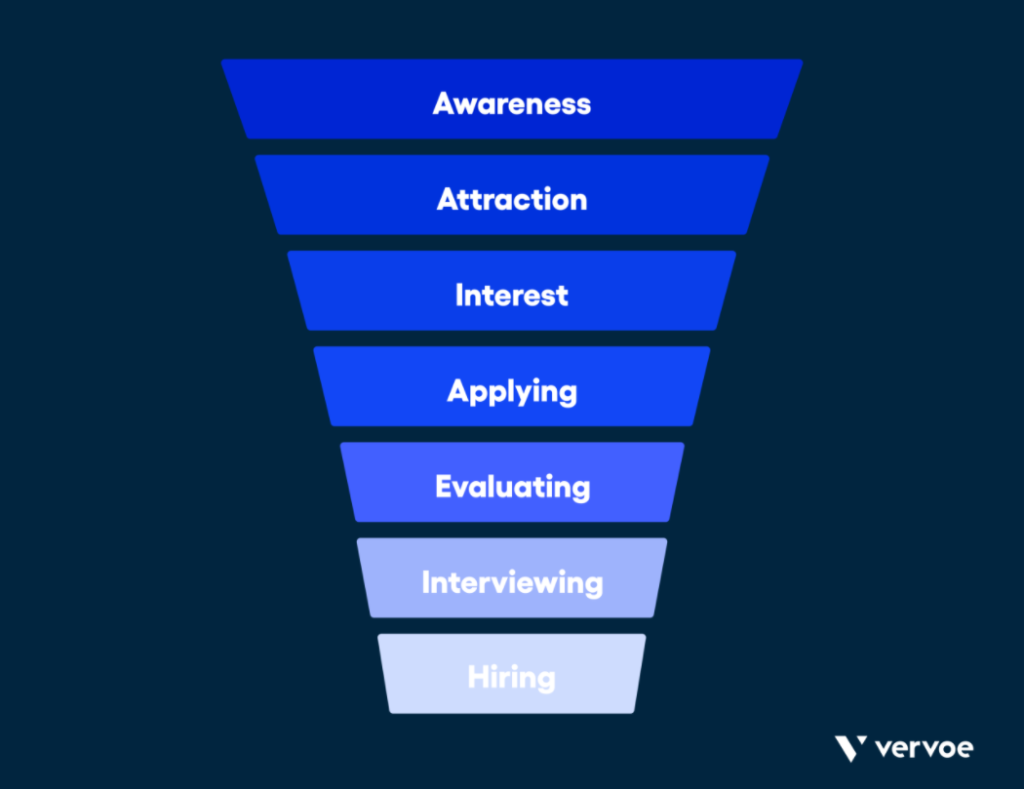Typically, background screening is conducted at the very end of the hiring process: between the interview stage and the job offer. But why don’t organisations conduct background checks earlier? For many, the answer comes down to one factor – cost.
In this article, we explore the reasons background checks are usually left until the end of the hiring process, and examine some of the benefits for conducting checks earlier as a screening tool rather than validation technique.
As with any discussion involving the different stages of recruitment, it is useful to visualise the process as a funnel.
The hiring funnel
Most organisations use a hiring funnel that looks something like this:

For the purposes of this article, we are interested in the last three stages: evaluating, interviewing, and hiring. As the funnel narrows, more candidates are “screened out: to create an ever-shrinking shortlist.
Here’s an example of how the process could work:
1. An open position may attract 500 applicants.
2. An automated CV review narrows this group to 100.
3. The 100 candidates are asked to complete an online skills assessment.
4. The top 20 candidates progress to the interview stage.
5. The interview process identifies 4 stand-out candidates.
6. After a final review, 1 candidate is offered the role.
But when exactly should background checking take place? Checking hundreds of candidates would be prohibitively expensive. It makes sense, therefore, to delay the checks until after the initial rounds of screening – the CV review and the skills assessment.
By this stage, the employer has three options:
1. Conduct background checks for all 20 candidates before the interview stage.
2. Conduct background checks for the 4 shortlisted candidates after the interview stage.
3. Conduct a background check for the final candidate (only) before the job offer is made.
While costs will vary depending on the type and number of checks required, option 1 is clearly the most expensive. However, this option provides interviewers with the assurance that all 20 candidates have passed the background screening checks.
Most organisations opt for option 2 and would check all 4 of the shortlisted candidates rather than screening a single candidate only. Even though this is more expensive than background checking a single candidate, doing so is a risk-mitigation approach that saves time in the event that the final candidate:
- doesn’t pass the background check
- declines the job offer, or
- exits the organisation soon after employment.
Clearly, conducting background checks on the final group of shortlisted candidates is a smart approach. But this doesn’t mean organisations should not consider using background checks earlier in the process. Here are some arguments for doing so.
Using background checks earlier as a screening technique
Organizations screen out candidates using several techniques including:
- CV screening (manual or automated)
- Skills assessments
- Interviewing.
Most talent acquisition experts do not regard background checks as a screening technique. Rather, they are seen as “due diligence” or a final validation that final-round candidates have the background and skills they claim to possess.
But why not use background checks earlier in the process as a screening tool? Benefits include:
Catching mistruths as early as possible. According to Indeed, an estimated 40% of people lie on their CVs and 3 out of 4 employers have caught a lie on a candidate’s CV. For many talent acquisition professionals, it makes sense to screen out these truth-stretchers as soon as possible in the hiring funnel.
Only assessing and interviewing candidates who pass relevant checks. Even with the help of technology, CV screening, skills assessments and interviewing all take time and money. Running checks such as a National Police Check as early in the process as possible (for example, after the CV screening but before the skills assessment) will ensure that only verified candidates will progress down the funnel.
Interview with confidence. By the time an organisation conducts a final-stage interview, several things are happening.
- Firstly, the internal and external recruiting costs of attracting and assessing that candidate (cost-per-applicant) have amassed by this stage.
- Secondly, interviewers can become invested in their final choice (“I think this is the one”), and want the confidence that their chosen candidate is indeed eligible for the position.
- Finally, this stage often involves the presence of senior or executive-level staff whose time is expensive. Part of the cost-per-applicant equation includes calculating the number of hours times the hourly salary of all employees involved in the interviewing.
It comes down to maths. Is the cost of assessing and interviewing potentially dozens of ineligible candidates higher than the cost of screening those candidates out beforehand with background checks? If so, it may make sense (depending on volume) to conduct background checks earlier in the process. CVCheck offers a fast and cost-effective solution for busy employers who want to hire confidently.




